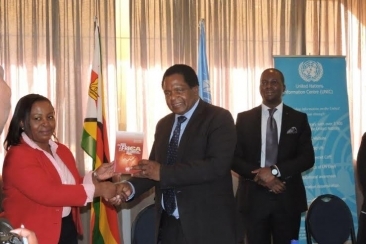
The African Capacity Building Foundation (ACBF) took a leading role in the launch of the United Nations Conference on Trade and Development (UNTAD) annual flagship publication entitled “Economic Development in Africa Report 2016” subtitled “Debt Dynamics and Development Finance in Africa.” in Harare, Zimbabwe on 21 July 2016.
Dr. Thomas Munthali, ACBF’s Director of Knowledge Monitoring and Evaluation in his presentation at the launch indicated that the report addresses debt dynamics in the context of the changing development finance landscape.Dr. Munthali also highlighted the main focus, findings and policy recommendations of this year’s report. He said the report questions, “How can Africa finance the SDGs and maintain debt sustainability?” and considers several financing mechanisms, including external and domestic debt, the use of complementary modalities such as Public-private partnerships and remittances and diaspora bonds, and how resources could be mobilized through curtailing illicit financial flows.
The report provides clear policy recommendations on raising adequate levels of financing for development from domestic and external sources to meet development goals and achieve structural transformation. Specifically, the report points out that Africa must critically assess its capacity to tackle its significant development challenges in light of its development finance requirements. This will entail a redoubling of efforts to harness potential and innovative sources of finance, including those that may come from the private sector, such as through public–private partnerships, while also tackling rising levels of both external and domestic debt. Africa and its partners will also need to revisit existing debt sustainability frameworks. Debt sustainability is critical for Africa as it seeks to implement the Addis Ababa Action Agenda, achieve the Sustainable Development Goals and sustainably transform the continent.
The official launch was presided by the Zimbabwe Minister of Macro-Economic Planning and Investment Promotion Honourable Dr. Obert Mpofu who was represented by his permanent secretary Dr. Desire Mutize Sibanda. Dr. Sibanda made a special plea to ACBF to help in strengthening capacity in various government sectors including the tax administration, customs, immigration, central bank and others so that civil servants are well equipped especially in dealing with curtailing of illicit financial flows. Dr. Munthali indicated that the new ACBF Strategy 2017 to 2021 effectively handles such capacity gaps.
The latest ACBF report entitled “Africa Capacity Report 2015” subtitled “Capacity Imperatives for Domestic Resource Mobilization in Africa” is one of the many publications that ACBF has produced to aid government’s clamp down on illicit financial flows and identifies some of the complimentary sources of revenue. The United Nations Information Centre (UNIC) coordinated the logistics of the launch while the Macroeconomic and Financial Management Institute of Eastern and Southern Africa (MEFMI) was a partner in the launch. The launch was attended by more than 60 people representing the media, civil society, public sector, international development community and the academia.





